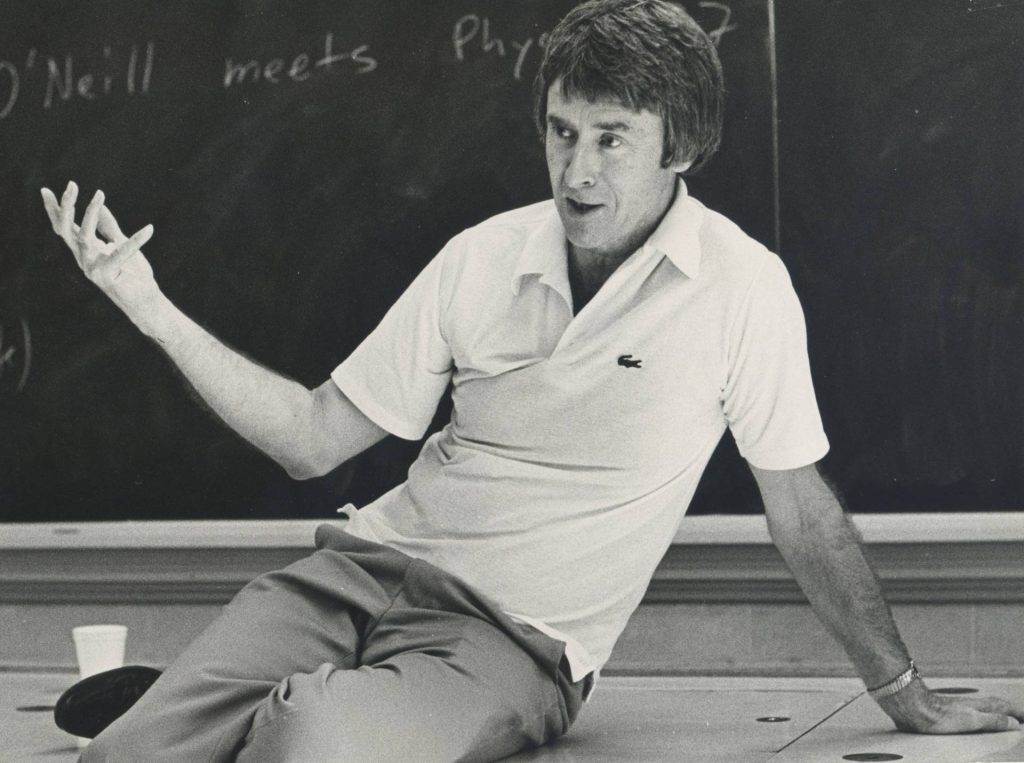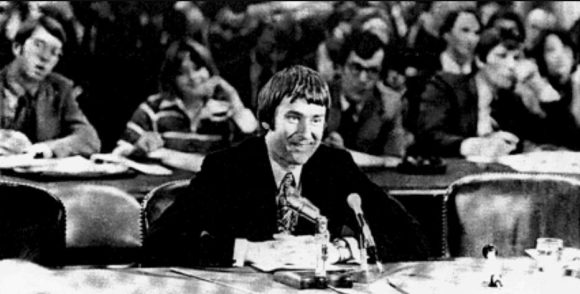Who was Gerard K. O’Neill?
In 2023, the contest was renamed for Dr. Gerard K. O’Neill, a physicist and space settlement pioneer whose interests and life’s work focused on opening the cosmos to all humanity. This contest is inspired by the thought experiment he conducted as a professor at Princeton in the 1970s by posing the following question to his freshman physics students:

"Is the surface of a planet really the right place for an expanding technological civilization?
-Professor O'Neill to his freshman physics students at Princeton University
Surprisingly, the conclusion they came to was that the best site was “somewhere else,” in orbit or in “free space,” and this lead to the publication of his book The High Frontier: Human Colonies in Space in 1976. Here, O’Neill first outlined his concept of “Islands in Space” and how humans might be able to make livable settlements in free space by addressing engineering challenges like in-space manufacturing, raw materials, energy production and storage, food supply and agriculture, radiation protection, artificial gravity, day-night cycles, etc. The challenges, however, extend beyond engineering, as O’Neill addressed questions of culture, economy, security, government, leisure, health, human psychology, and more.
Gerard O’Neill continued to advocate for space settlement for the rest of his life, joining with colleagues to design a number of large space settlements including the Stanford Torus and the O’Neill Cylinder. In 1977, O’Neill and his wife Tasha launched the Space Studies Institute, a nonprofit space and science research organization whose offices remained in Princeton until 2009. During his time at Princeton, O’Neill also hosted a series of Space Manufacturing Conferences, yearly gatherings to spread the word about his space habitat concepts, which drew attendees from all over the country.
Gerard K. O’Neill passed away in 1992, but his legacy lives on in many ways, particularly through the efforts and advocacy of the National Space Society. In 2020, a documentary about his life entitled The High Frontier: The Untold Story of Gerard K. O’Neill was screened at several film festivals, and it is now available to stream on several platforms (see https://thehighfrontiermovie.com).

About the Contest
This contest has been held annually since 1994, and it is a direct descendant of Professor O’Neill’s original thought experiment, but instead of college freshman the contest is designed for students up to 12th grade. Students are not given any requirements other than the project must focus on a free space settlement concept. Settlements may not be on a planet or moon, although support activities such as mining may be. Settlements must be permanent homes, not temporary work camps. Submissions may focus on one or a few aspects of space settlement and supporting systems, including mines, activities leading up to settlement (such as space hotels), economic and social issues, etc. Designs, original research, essays, stories, models, artwork or any other orbital space settlement related materials may be submitted.
Contest deadline, prizes, and certificates:
- All submissions must be received by February 15 at 02:00am PST.
- Participant certificates will be distributed in PDF form. You will get a link to this certificate when you submit your entry.
- Winner certificates, also in PDF format, will include the names of the students. These should arrive via email by late August to the registered user email address.
- The best submission, regardless of category, wins the grand prize. The submission will be hosted on the contest web site. Finally, the highest ranking entry whose student(s) attend(s) ISDC will receive the Herman Rubin Memorial Scholarship of $5,000 and give a talk at the conference.
- Contest categories are
- 7th grade and younger: individual, small group (2-5 students), large group (6-12 students),
- 8th grade: individual, small group, large group,
- 9th grade: individual, small group, large group,
- 10th grade: individual, small group, large group,
- 11th grade: individual, small group, large group,
- 12th grade: individual, small group, large group.
Additional categories based on Artistic and Literary Merit are also included in the contest. Starting in 2023, the top entry in the Artistic Merit and Literary Merit categories, respectively, will each receive a $500 Scholarship (prize names pending).
Students can participate from anywhere in the world, and we receive a large amount of international submissions. Individuals, small teams of two to five, and large teams of six to twelve are judged separately. Entries are also grouped by age/grade of the oldest team member for judging purposes. We also have special categories for Artistic and Literary Merit in our ongoing effort to promote STEAM education and to remind us that space is for everyone. The grand prize is awarded to the best entry regardless of contestant age.
Beginning in December each year, students can submit their entries on our AwardForce Platform at this address (also linked via Red Button at the top of the page that says “Enter the Contest”): https://spacesettlement.awardsplatform.com.
There is an entry fee of $15 which can be waived in hardship cases. A PayPal account and/or major credit card is needed to pay the registration. Submissions must be received by February 15, and judging commences immediately upon closing of the submission portal. The Grand Prize and other awards are typically announced around the end of March when judging completes.
Students who participate in the contest are encouraged to attend the annual International Space Development Conference (ISDC), especially if they are awarded a prize. This conference is a great place to learn about cutting edge research and commercial enterprises related to the development and habitation of space. Students attending ISDC get to sit in on professional sessions with presenters from industry, government, and academia discussing their takes on the new space economy that will grow exponentially over the next few decades. We also offer students many opportunities to be actively involved in the conference, including presenting a poster of their concept, giving a short talk on their design in the middle of professional sessions, and attending special plenary sessions tailored specifically for students. Students from all over the world congregate to share and discuss ideas.







